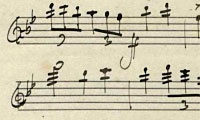The Music and Sound Archives heritage, with more than 250 thousand pieces, congregates an extensive collection of books, periodicals, partitions, photographs, concert programs, manuscripts and opera librettos, autographs of illustrious composers, correspondences, photographs, LPs, CDs and DVDs.
With rare pieces, many of them donated by renowned composers and maestros, all the set has some relation to the music history in Brazil and in the world. It is one of the most important existing musical heritages in the Country, being of basic relevance for researchers and musicologists.
The heritage created in 1952, today houses the 3rd floor of Palacio Capanema, upon initiative of the then director and writer Eugênio Gomes (1897-1972), starting from relics as rare books and partitions, extracted from the Brazilian National Library general collection by the librarian and musicologist Mercedes Reis (1921-2015).
Treasures
The basis of the Music and Archive Heritage is in the pieces brought from Portugal by D. João VI, belonging to the so-called Real Library, enclosing, among other documents, books, partitions, opera librettos, liturgical books, missals and treaties. Thereza Christina Maria Collection also deserves great prominence, constituted by works that had belonged to empresses D. Leopoldina and D. Thereza Christina, including Mozart, Haydn, Beethoven, Pleyel partitions in first editions beyond rare books and copies of the periodical Brazil Musical, dedicated to S.M the Empress of Brazil.
Other important collections, such as Conde da Barca, J.A. Marques and Salvador Mendonça are also represented with works from the 16th and 17th centuries.
The heritage was enriched throughout the years, by means of legal contributions, donations and purchases. During the 1950s, the highlight is to Abrahao de Carvalho musical library acquisition, by the Federal Congress law, (1891-1970), the greatest particular library in Brazil, with about 17 thousand pieces, which propelled the structuring of a music heritage for the Brazilian National Library in a definitive way. In the library, the following rarities can be emphasized:
- Works of the theorist and philosopher Gioseffo Zarlino (1517-1590);
- Treaties of Jean Philippe Rameau (1683-1764) and Francisco Ignácio Solano (c.1720-1800);
- First editions of Franz Liszt compositions (1811-1886);
- The work “Regole del contrapunto pratico “ (Nápoli, 1794), of Nicola Sala (1713-1801), single copy in Brazil;
- Compendium of theoretical and practical music (Port, 1816) of friar Domingos de São Jose Varella, the First part of Muyto Alto Music Bookstore Index, and Poderoso Rey Dom João IVº, Ours Sir, anno 1640, which talks about the musical treasure, destroyed by Lisbon great earthquake in 1755;
- Ricardo Wagner and Francisco Liszt personal recollections (Lisbon, 1874), of Platon de Waxel, printed only in 50 copies, of which Abrahão de Carvalho had volume nº 23.
The purchase of Luciano Gallet collection (1893-1931) also incorporated the work of the composer Glauco Velazquez (1883-1914), which was in possession of that composer and friend.
By means of particular donations, the following composers’ autographs had been added to the heritage; Oscar Lorenzo Fernandez (1897-1948), Alberto Nepomuceno (1864-1920), Francisco Braga (1868-1945), Meneleu Fields (1872-1927), Brasilio Itiberê (1896-1967), Ernesto Nazareth (1863-1934), Francisco Mignone (1897-1986), Cesar War-Fish (1914-1993), Helza Cameu (1903-1995), among others.
In the musical manuscripts collection of Brazilian composers, the highlight is to the operas Il Guarany, Fosca, Maria Tudor and Salvator Rosa, of Carlos Gomes (1836-1896), great musical reference of Brazil. This documentary set received in 2009 the Nomination in the Brazil National Register from the Brazilian National Committee of the Memory of the World Program from UNESCO, which confirms the outstanding value of the collection.

